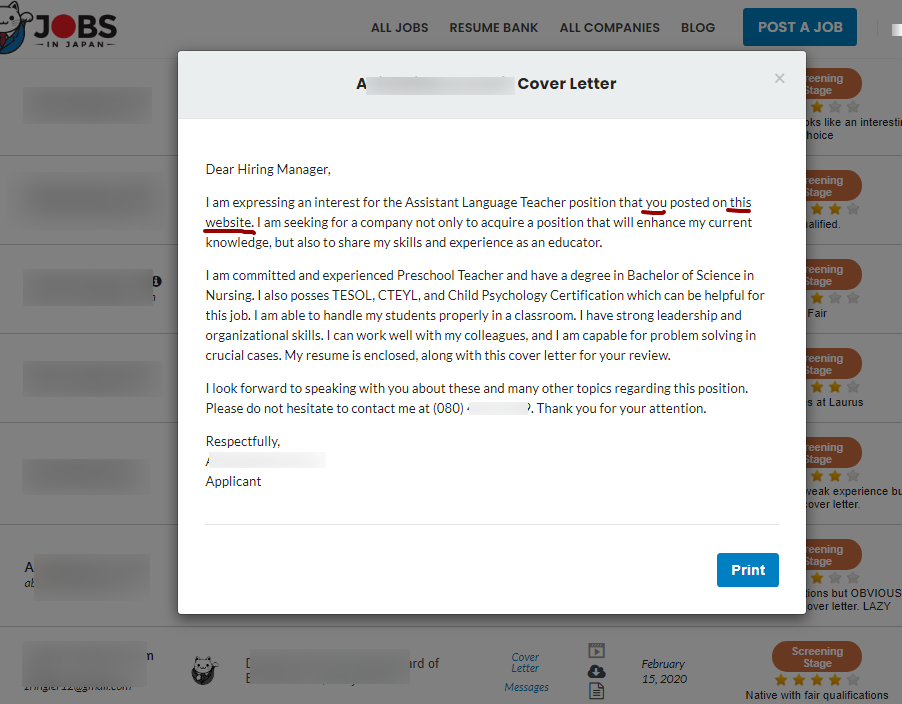
It’s your job to hire the right people – it’s our job to make it easier. It does not matter how many filters and screening functions we add to JobsinJapan.com, the hiring manager is going to have to take a look at a lot of applications and this takes up a lot of time. The harsh reality is that we are just too busy to look at every application in depth and most applications do not warrant a good look.
Employers need a process to eliminate the bad applications, without getting rid of the good ones while doing this. Allow me to share with you the method that I use when I hire and assist other companies with their hiring. This knowledge has come from years of trial and error in working out what works and what doesn’t.
For starters, filter out candidates by language or location and those who do not meet the minimum criteria.
I don’t bother opening the resume unless the cover letter catches my attention.
Cover letters – without even looking at the name, I read the cover letter. The main thing that I am looking for is whether the person took the time to personalize the cover letter with:
-
- Mentioning the job title and my company’s name → I know that the applicant has read my job ad and is specifically interested in this position.
- Something specifically mentioned in the job description → this shows me it isn’t just a generic cover letter that the applicant submits for every application and also gives me an idea what part of the job they are interested in.
- Spelling, grammar and syntax → other than showing English ability, the applicant cares enough about the position to double-check the cover letter to make sure that it makes sense, is relevant to the position being advertised and is error-free.
- Is there any mention of what he or she can do to perform the job? → Tell me about the skills/abilities that you have to do the job. It is not enough just to mention experience, tell me what skills you have gained from that experience that would be relevant to this job. It also shows me that they want “my” job.
- Does the applicant mention what they can do for my company or is the tone selfish? → I need to find an employee who is the right fit for the job I have, and I don’t have enough time to read what the applicant wants. They need to give me a reason to want to interview them. I want to know what motivates them and I hope the main concern isn’t the number of vacation days in the contract.
Without these things, I do not even look at the resume. The person could have a great resume and may be qualified to do the job, but by these criteria, I already know if the person is lazy and unacceptable. Let me give you a few real life examples.
1. Mentioning the Job Title and my Company Name
Take a look at the following cover letter. This person is applying for an English teaching position and has TESOL certification; therefore, I think that she has the skills to do the job.

Notice in the first sentence. “…position that you posted on this website.” From the first sentence alone, we know that she used this same template to apply to multiple ALT positions on multiple job sites without taking the time to explain why she was interested in the exact position. How hard would it be to just change “you” to ABC Academy and “this” to JobsinJapan.com? I want the applicant to mention my company name and make me feel special.
We call this “Spray and Pray” and this person wants any job they can get and not specifically this job. I am 99% certain that she will make a bad employee and will have no loyalty to the company.
2. Something specific mentioned in the job description
If you wrote a good job description (tips here), then something in the description is going to resonate with the job seeker. It would make sense to give consideration to someone who wants your job over other positions rather than to someone who just sent a generic cover letter template.
My favorite one-way ticket to the trash can is when an applicant writes “my skill-set is an ideal match for the position offered” (or similar) and then does not give any details in the cover letter as to which skills meet specific requirements mentioned in the job description. I guess he/she is offering me a challenge to search through her resume and find where she is a perfect match. If she were actually a perfect match, this person would have listed items from the job advertisement along with her matching skills. Basically this person is lazy and offering fluff with this “perfect fit” phrase.
3. Spelling, grammar and syntax
If the applicant is not putting the effort into submitting an error-free document designed to get them a better job (i.e. a better life), do you think he or she will put the effort into doing a good job for my company once they are hired. I seriously doubt it.
The quality of the cover letter gives me a pretty solid indication of whether the applicant is a fit or not. It is common for people to have others check their resume (just like with most important documents, having a proofreader and second set of eyes is important), but most applicants do not get a second opinion on cover letters for some reason. This teaches you a lot about a candidate, and if they are willing to submit an application with errors throughout, then they may well be willing to do other work that is littered with errors.
4. Is there any mention of what he or she can do to perform the job?
For your enjoyment, I have copied some actual examples from cover letters (I am not creative enough to make these up). After these examples, I have noted what I am thinking after reading these phrases.
- I have passed JLPT N2 and would like to work in a Japanese language working environment.
Congratulations. I want someone who is interested in what my company does and not just your personal language development and your interest in Japan. Do you know what we do? How does that interest you?
- I have ten years experience teaching English.
This doesn’t tell me anything! What are your areas of strength? Do you do best with adult students? Large groups? What skills have you acquired in these ten years that are relevant to this job that I am posting?
- I’ve lived in Japan for fifteen years and have taught every sort of class and every sort of student.
Similar to the previous comment, what does this tell me about your suitability for my position? Nothing! Great, you have taught every sort of class, but how well did you teach them? How did you measure that? Do you have any evidence of your teaching skill? What value could you bring to my position? I don’t see any passion or interest here for taking my position, it just seems like it would be another company to put on your resume.
I think you get my point. Everyone wants to work in a good environment with interesting and rewarding work. The applicant needs to show on the cover letter what skills (even if that skill is a good work ethic and interest in your company) that he or she is going to bring to the job.
5. Does the applicant mention what they can do for my company or is the tone selfish?
Again, here are some more actual comments and my thoughts while reading them.
- I am looking for a job where I could develop my business skills.
That’s nice, but I want someone to help increase my profit. Sure you will grow professionally here but what skills do you have now to offer me. If I pay you a salary, I expect to recoup my investment in you and more. You should also be developing your skills on your own time as well.
- I am interested in a teaching job that offers a visa.
I am interested in a teacher that prepares well, engages the students and is helpful. If that is you, I will give you a visa. By the way, what in particular did you find appealing about our school that made you want to apply?
- If you have a good position for me, please contact me.
Is this person serious? Is it possible to be any lazier? Worryingly, you would be surprised how common it is to see this. As soon as I read this, the application hits the trash can.
- With experience from your company, I hope to improve my career further.
So you want professional development from my company allowing you to get a job somewhere else? Pass
- I hope to expand my interpersonal and professional skills and I hope to increase my communication skills, while working in a comfortable atmosphere.
Why is this all about you? What about what I want and need from my staff? The reason I am trying to hire someone is because I can’t do everything with the staff we have. How are you going to help us?
Bonus tip.
Super Long Cover letters – While I appreciate the applicant’s dedication, a super long cover letter frustrates me. The job seeker should know that the purpose of the application (cover letter and resume) is not to get a job. The purpose is to get an interview which then may allow you to get the job. I know if I hire this person, he/she is going to waste my time. The applicant has just demonstrated that he/she is not a good communicator, because effective communication means understanding what the reader is expecting and hoping for. They should know that a hiring manager doesn’t have time to read a 1500 word cover letter. Being concise yet still communicating meaning well is a good indicator of future job performance.
Anyway, the applicant has just demonstrated that he/she is not a good communicator. I know if I hire this person, he/she is going to waste my time.
If you cut applicants following these guidelines, now you will have a much more manageable list of applicants where you can take a look at the resumes to narrow down your short list of those applicants you wish to interview.
In our next article, I will tell you about how a banana ensured I got a great hire. Yes, this is a teaser for my next article, and I’m sure you are wondering what a piece of fruit has to do with a great hire. You’ll get it when you read it and you’ll be glad that you did because it will help you cut down those “spray and pray” applications by a lot, saving you a lot of time.
If you have any tips or techniques that help you hire the best people, please share your experience with us (confidential if you like), and let us know if you have any questions.















